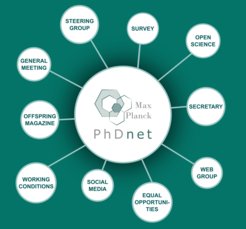
PhDnet – about us
The Max Planck PhDnet (PhDnet) is a platform for exchange among the about 5000 PhD candidates working at 86 Max Planck Institutes (MPIs) of the Max Planck Society (MPS) across all three sections Biology & Medicine (BMS), Chemistry, Physics & Technology (CPT), and Humanities & Social Sciences (HS). The PhDnet was founded in 2003 at its first meeting in Heidelberg to improve interdisciplinary cooperation, optimize doctoral education and scientific exchange, and strengthen academic solidarity.
The PhDnet consists of all doctoral researchers of the Max Planck Society. Doctoral researcher are represented by their institute representatives. Internal representatives take care of the communication between PhDs and other organs within their institutes, while external representatives are responsible for the communication to the other PhDnet and MPS organs. Furthermore, institutes are clustered in regional hubs to foster exchange and communication between geographically close institutes.
The PhDnet organs are the workgroups and the Steering group. Currently, we have nine workgroups, which are responsible for various tasks important for the PhDnet. If you are interested in joining one (we always welcome new members) please click on the group you are interested in most.
The Steering group functions as the main communication channel between PhDnet and other organs within the Max Planck Society (like general administration, general works council, scientific staff representatives, PostdocNet, Max Planck Alumni Association and more).

Each year, institute PhD representatives and other interested doctoral researchers gather at the annual meeting to discuss about common aims and strategies to further improve working conditions for PhD candidates at MPIs. In 2015, new statutes were adopted that define the role and the election procedure of internal and external PhD representatives at the MPIs. For a valid election as external PhD representative a participation quorum (50% of the eligible voters) and an absolute majority is necessary.
At the general meeting, the steering group is elected as legitimate representation of all PhD candidates by the external PhD represenatives and various workgroups form to perform the day-to-day business during the year. In addition to the annual general meeting, regional hubs provide a platform for exchange between PhD candidates from different institutes.
